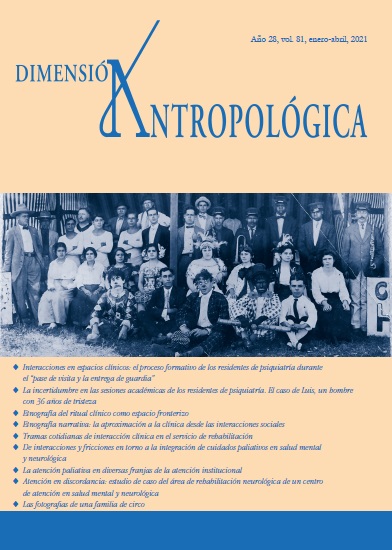Published 2021-04-30
Keywords
- Español
How to Cite
Abstract
This article explores how uncertainty is expressed during a psychiatry academic session. It looks into how psychiatrists and psychiatry resident doctors deal with uncertainty. What mechanisms or tools are employed to dissipate it or manage it? This work is part of a broader research in clinical contexts that seeks to analyze and interpret the activity strips that constitute them, as well as to account for intersubjective interactions related to specific health problems. This study uses an ethnographic approach that is supported by narrative methods. Results are analyzed employing some of Erving Goffman’s concepts around “frame analysis”. Some types of uncertainty found are communicational, conceptual, bureaucraticadministrative, and those referring to the limits of psychiatric knowledge. The mechanisms that psychiatrists use to face uncertainty are knowledge, the discussion between peers and senior doctors, the use of drugs, hospitalization as a way of monitoring and, above all, the effect of time in hope that it dilutes doubts. The different degrees, moments, and ways of solving doubts in psychiatric clinical practice depend on the place that the actors have in the field and their frames of reference.
Downloads
References
- Alegre Palomino, Y. y M. Suárez Bustamante, “Familiograma es un instrumento que evalúa el funcionamiento sistémico de la familia, RAMPA, vol. 1, núm. 1, 2006, pp. 48-57.
- Candaudap-Ortega, M., “El currículo oculto en la formación del médico. El caso de la subespecialidad en cirugía plástica, estética y reconstructiva”, Educación Médica, vol. 13, núm. 2, 2010, pp. 101-105.
- Castro, Roberto, “El campo médico en México. Hacia un análisis de sus subcampos y sus luchas desde el estructuralismo genético de Bourdieu”, Sociológica, año 34, núm. 97, 2019, pp. 73-113.
- Chinhu Amparán, Aquiles y Alejandro López Gallegos, “Arenas y símbolos rituales en Victor Turner”, Argumento. Estudios Críticos de la Sociedad, núm. 40, diciembre de 2011, pp. 137-152.
- Cooper, Rachel, “What is Wrong whit the DSM?”, History of Psychiatry, vol. 15, núm. 1, 2004.
- DeForge B.R. y J. Sobal, “Intolerance of Ambiguity in Students Entering Medical School”, Social Science & Medicine, vol. 28, núm. 8, 1989, pp. 869-874.
- Foucault, Michel, Vigilar y castigar; Nacimiento de la prisión, Medellín, Siglo XXI, 1999.
- Fox, R.C., “The Evolution of Medical Uncertainty”, Milbank Memorial Fund Quarterly Health Society, vol. 58, núm. 1, 1980, pp. 1-49.
- Goffman, Erving, Frame Analysis: los marcos de la experiencia, Madrid, CIS, 2006.
- Good, Bayron, Medicina, racionalidad y experiencia, España, Bellaterra, 2003.
- Hamui Sutton, Liz, “Las narrativas del padecer una ventana a la realidad social”, Cuicuilco, núm. 52, 2011.
- Hamui-Sutton, Alicia, Tania Vives-Varela, Samuel Gutiérrez-Barreto, Senyasen Castro-Ramírez, Carlos Lavalle-Montalvo y Melchor Sánchez-Mendiola, “Cultura organizacional y clima: el aprendizaje situado en las residencias médicas”, Investigación en Educación Médica, vol. 3, núm. 10, 2014, pp. 74-84 (p. 76).
- ____________, Tania Vives-Varela, Samuel Gutiérrez-Barreto, Iwin Leenen y Melchor Sánchez- Mendiola, “A Typology of Uncertainty Derived from an Analysis of Critical Incidents in Medical Residents: A Mixed Methods Study”, BMC Medical Education, vol. 4, núm. 15, 2015, pp. 1-11.
- Hautamäki, Lotta, “Uncertainty Work and Temporality in Psychiatry: How Clinicians and Patients Experience and Manage Risk in Practice”, Health, Risk & Society, vol. 20, núm. 1 y 2, 2018, pp. 43-62.
- Heler, Mario, “El problema del posicionamiento de la producción del campo de producción del campo profesional de trabajo social”, documento electrónico, recuperado de: [http://www.catedras.fsoc.uba.ar/heler/mheler2010_14.07.10.pdf], consultada el 2 de octubre de 2019.
- Henckes, Nicolas y Lara Rzesnitzek, “Performing Doubt and Negotiating Uncertainty: Diagnosing Schizophrenia at its onset in Post-war German Psychiatry”, History of the Human Sciences, vol. 31, núm. 2, 2018, pp.1-23.
- Martínez Hernáez, Ángel, “Cuando las hormigas corretean por el cerebro: retos y realidades de la psiquiatría cultural”, Cadernos Saúde Pública, vol. 22, núm. 11, 2006.
- ____________, Antropología médica. Teorías sobre la cultura, el poder y la enfermedad, 1ª ed., España, Anthropos, 2008.
- ____________, Síntomas y pequeños mundos. Un ensayo antropológico sobre el saber psiquiátrico y las aflicciones humanas, México, UAM, 2018.
- Menéndez, Eduardo, “Antropología médica en América Latina 1990-2015: una revisión estrictamente provisional”, Salud Colectiva, vol. 14, núm. 3, 2018, pp. 461-481.
- Parsons, Talcott, The Social System, Londres, Routledge, 1991.
- Turner, Victor, La selva de los símbolos. Aspectos del ritual ndembu, Barcelona, Siglo XXI, 2020.

